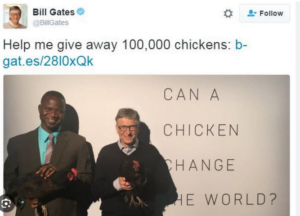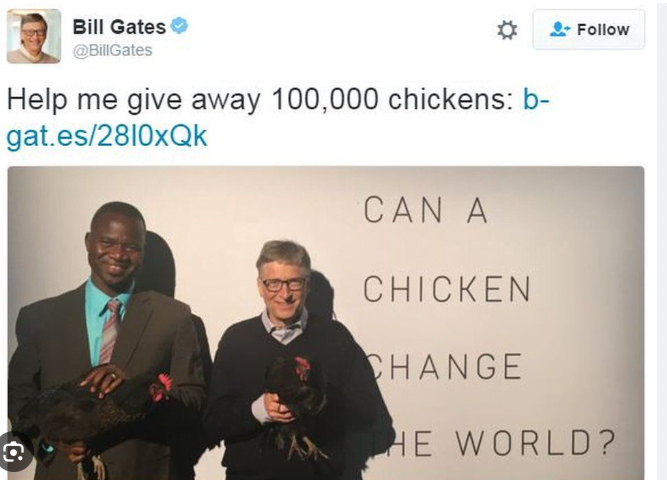On June 7 2016 Bill Gates issued a letter titled “Why I Would Raise Chickens”. In it he outlined his own Marshal Plan for lifting African countries out of poverty. The immediate goal was to “assist 30 percent of rural families in Sub-Saharan Africa in raising improved breeds of vaccinated chickens up from only 5 percent currently.” He believed his strategy will be successful because chickens are: first simple and inexpensive to care for; second a good investment; third they help keep children healthy; and fourth they empower women. The announcement would have been hilarious if it didn’t come from the world’s second wealthiest man with the diplomatic support of the world’s wealthiest and most powerful country.

There was however a stunning silence all around particularly from African governments and the sleepy continental African Union. The vigilant African intelligentsia’s gut reaction was perhaps summed up in the tweet of Nigerian satirist Elnathan John who wrote “Our father Who art Uncle Bill Hallowed be thy whims…” The skepticism is justified.
It is unclear how Bill Gates and his foundation could claim that a country like Nigeria required any more chickens. The country’s commercial poultry production is worth more than (US$3.2 billion). Over 14 million people are employed in the poultry industry in some capacity and up to 85 million people manage rural family poultry.
Apparently even without the assistance of volunteers the nation’s poultry sector contributes more than 25% of the Nigerian economy’s Agricultural Domestic Product. The threat from abroad manifests itself in the form of bird flu infection the smuggling of prohibited and dangerous poultry products and the attempted dumping of foreign products.
Nigeria is currently ranked first in Africa for egg production and fourth in broiler meat production after South Africa and some North African countries. In fact Africa is doing increasingly well in the production of chicken meat. South Africa produces 1.5 million metric tons of chicken meat per year Egypt 685 000 metric tons Morocco 560 000 metric tons Nigeria 268 000 metric tons and Algeria 254 000 metric tons. In this sector there is also a healthy practice of interregional commercial investment. To diversify away from their home market companies are moving north from South Africa where there is massive potential. In Ethiopia Angola Tanzania Namibia and Zamba indigenous South African companies are introducing modern commercial farming.
Frankly speaking Bill Gates’ obsession with charity always looked barmy and contradictory. In 2013 he began investing in chickenless eggs because “Raising meat takes a great deal of land and water and has a substantial environmental impact”. Put simply he said “there’s no way to produce enough meat for 9 billion people”. But then in 2015 he believed that more chickens is the answer to African poverty. Somehow 100 000 chickens is the magic number indeed.
But there’s a lot more to be concerned about. It is important to note that Bill Gates’ overarching belief is that there are too many humans on the planet and that something should be done about it. As a result he advocates for increased investment in vaccines. Increased vaccination should logically result in a significant reduction in premature deaths across populations but our global charity Lord Voldemort oddly frames things when he said the following at a renowned Ted talk event “Innovating to zero!”:
“First we’ve got population. The world today has 6.8 billion people. That’s headed up to about nine billion. Now if we do a really great job on new vaccines health care reproductive health services we could lower that by perhaps 10 or 15 percent but there we see an increase of about 1.3. …Vaccines are something I love.”

